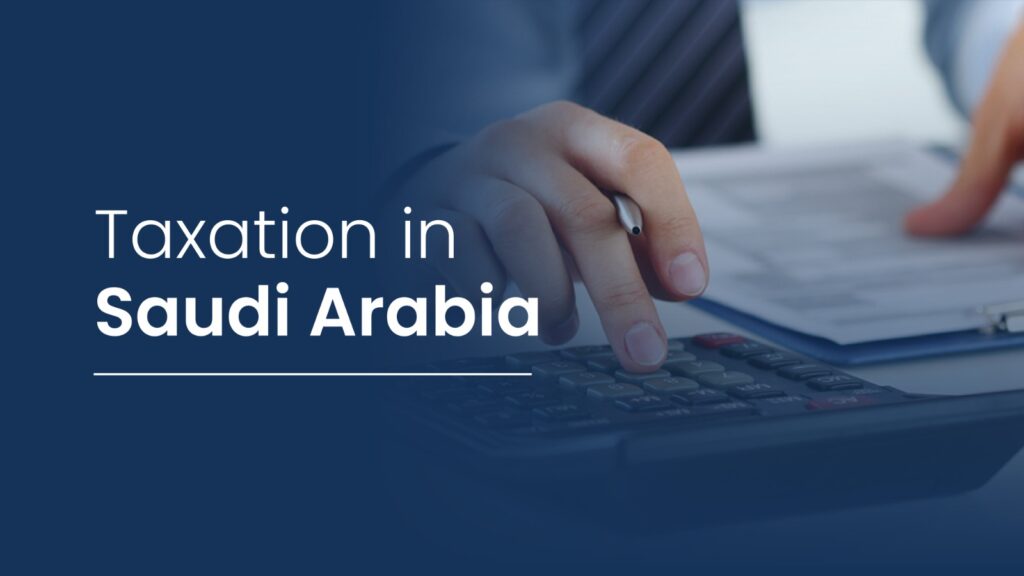Is there any tax in Saudi Arabia? This might be the question you have since the day you started your new life in the kingdom? Curious to know about the taxation in Saudi Arabia? Then this blog is for you!
Saudi Arabia is in its path to achieve its ambitious plan of Vision 2030 and the nation is witnessing tremendous economic changes, and is open to international businesses, inviting global investors and enterprises to contribute to the national income, by entering the Saudi market. So it is imperative for global investors and businesses to have a comprehensive idea regarding the taxation in Saudi Arabia before entering the Saudi financial market.
Below are some general information regarding the taxation in Saudi Arabia:
- There is no personal income tax in Saudi Arabia
- No local or regional tax
- Foreign owned Saudi entities have to pay competitive tax
- Saudi Arabia has single tax authority – Zakat, Tax and Customs Authority (ZATCA)
- Businesses have their own internal financial year, thus no standard tax year
- Electronic process can be completed through single web portal available in English
Curious to know more about the tax system in Saudi Arabia? Read the blog further!
What’s new about taxes in 2024?
Saudi Arabia started a 30-year tax relief initiative on 1 January 2024, for multinational corporations operating regional headquarters (RHQ) within the kingdom of Saudi Arabia. The eligible companies can enjoy the liberty to pay zero withholding tax and zero corporate income taxes for approved operations in the kingdom. Tax amnesty initiative of the country, “Cancellation of Fines and Exemption of Financial Penalties“, introduced in March 2020 to help the business mitigate the financial effect of COVID -19 pandemic was extended and will officially run till 30 June 2024.
Who pays tax in Saudi Arabia?
Your tax obligation depends upon whether you qualify to be considered a Saudi tax resident. An expat is considered a tax resident of Saudi Arabia, if you have a permanent residence in the country and live in the country for at least 30 days of the tax year.
The residents of the kingdom have to pay social security contributions. The foreign residents running their own businesses have to make business tax in the country. VAT and excise duties have to be paid by every resident of the kingdom. Zakat which is levied in both individuals and businesses has to be paid by both Saudi citizens and GCC nationals. The decision to pay Zakat by expat is purely dependent on them, although it is not compulsory for the expat to pay Zakat.
Tax System In Saudi Arabia for Expats
Tax laws in Saudi Arabia are different for residents and expats. Non residents earning money or doing business in the country have to pay withholding tax in the country. This is the amount of money that the country or company paying to the person is returned back to the kingdom. Withholding tax can be 5%, 15% or 20% depending upon the type of your business.
To prevent non-residents from paying double tax; in Saudi Arabia and their home country, ZATCA has tax agreements with 56 countries.
Self employed expats in the country have to pay corporate income tax at the standard rate of 20% of the profit.
Citizens and GCC nationals have to pay zakat, which is the small percentage of their net worth to the needy, however expats are exempted to pay zakat in the country. Thus the income tax for expats in Saudi Arabia differs from citizens and GCC nationals.
Types of Corporate Tax in Saudi Arabia
Value Added Tax
It is an indirect tax imposed on all goods and services that businesses sells in the kingdom. The present VAT rate in Saudi Arabia is 15%. For businesses with a value supply greater than SAR 375000, VAT registration is mandatory.
Customs & Excise Tax
All goods imported to the Kingdom of Saudi Arabia are subject to pay custom duties. Excise duties are charges on restricted goods.
Income Tax & Zakat
Foreign companies functioning in the kingdom have to pay a corporate income tax of 20% on their net adjusted profits at the end of the financial year. Shareholder structure influences the profit adjustment and can vary.
Withholding Tax
Withholding tax is a tax that is imposed on payments made by an entity in Saudi Arabia to an entity outside the country. The range of withholding tax is from 5% to 20%, but can vary depending upon the type of services.
Corporate Tax Rate In Saudi Arabia
Corporate tax rate in Saudi Arabia is 20% of the net adjusted profits. Also Zakat is charged at the rate 2.5%. Even though the corporate tax is 20%, income from below 2 activities have different rates.
- Income earned from hydrocarbon production in Saudi Arabia has a tax rate of 50 to 85%.
- The tax rate of the natural gas business should be independent of tax related to other activities.
How to Pay Tax in Saudi Arabia?
Saudi Arabia taxation system is very unique compared to other countries. Thus the payment is also unique. In Saudi Arabia, taxes have to be paid to the General Authority of Zakat and Tax (GAZT. The payment of tax can be done online. Following are the steps to be followed to pay Saudi taxes and be a part of the Saudi Arabia tax system.
- Register online with the General Authority of Zakat and Tax.
- Maintain records of your income, expenses and other financial transactions.
- Calculate your tax liability depending upon the tax rate and obligations.
- File tax returns with GAZT within the specified deadline
- You can pay the tax through either bank transfers, online payment or any other method specified by the tax authority.
- Be complaint of Saudi tax laws and new changes in the tax laws
If you are unsure of your tax obligations, never hesitate to seek professional advice regarding the Saudi taxation system.
How can Analytix Help You With Taxation In Saudi Arabia
Being in the business landscape of Saudi Arabia for more than a decade, we are well aware of the system of taxation in KSA. If you are looking to set up a business in Saudi Arabia, then you may need to pay income tax in KSA. We are a one stop solution for all the processes related to business setup in Saudi Arabia. Contact us to seek professional assistance for business set up and tax payment in Saudi Arabia.
Conclusion
Got clarity regarding various types of taxation in Saudi Arabia? We hope so! No matter whether you are a GCC national or expat in Saudi Arabia, understanding the tax system in Saudi Arabia is essential. We hope this blog provided you a clear picture on various types of taxes and Saudi Arabia tax rate. If you have any further query, feel free to reach out to us. Comment in the comment section, if you find this blog insightful.
Frequently Asked Questions [FAQ]
Is there GST in Saudi Arabia?
Saudi Arabia does not have GST, but instead have Value Added Tax (VAT)
What is the tax ID number in Saudi Arabia?
Tax ID number is an ID number issued by the General Authority of Zakat and Tax (GAZT) to all taxpayers who pay VAT, excise tax, or tax on your commercial activities.
Does Saudi Arabia have a tax system?
Yes, the Kingdom oF Saudi Arabia has a well defined tax system, covering every aspect of tax laws.
Do you have to pay taxes if you work in Saudi Arabia?
No, there is no personal income tax in Saudi Arabia. If you are an employee in Saudi Arabia, with no other forms of income, then you don’t need to pay tax in Saudi Arabia.
























